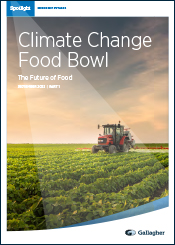Executive summary
Following one of the hottest summers on record, and with El Niño impacting food production and supply chains globally, the interconnected nature of climate change and food production has accelerated concerns about growing vulnerability of the world's food supply, with the knock-on implications for prices and availability. Rising temperatures, increased drought frequency, decreases in soil fertility and crop destruction from floods or storms form part of a longer list of risks to global food trade.
Dietary preferences and evolving food consumption patterns remain a key contributor to global climate change, calling for high-income nations to shift to plant-based foods to reduce food insecurity in economically vulnerable regions while tackling the carbon footprint associated with agricultural sector production.
The development and adoption of climate-resilient crops create new economic opportunities. Researchers, breeders and seed companies involved in the development of these crops contribute to technological advancements in agriculture. Farmers who adopt these resilient crops can potentially increase their profitability by producing higher yields and accessing niche markets focused on climate-friendly and sustainable products.
Growing food insecurity and the 2023 impact of El Niño disrupting the major rice bowls in India and China highlight the pressing need for action and investment in critical research to stabilize food production. Governments and non-government organization (NGO) initiatives can support these efforts by offering subsidies to farmers who are diversifying, investing in new varieties and/or considering changes in land use.
Insights
- Climate variability and unpredictability, geopolitical conflict, food price inflation and growing food insecurity are driving the need for structural change to respond to the climate change challenge and provide increased food supply chain resilience.
- Climate patterns related to the 2023 El Niño highlight the fragility of the major global food bowls. Rice export bans — as well as crop failures and reduced yields in India and major rice crop producers such as Thailand and Vietnam — led to price increases and price caps in markets such as the Philippines to protect lower-income groups from the threat of food insecurity.
- Geopolitical conflict is disrupting the flow of food, increasing cost and reducing the supply of critical crops in the face of growing demand. The Russia/Ukraine war has directly impacted the world's cereal crop output, fueling pricing inflation and supply restrictions.
- While genetically modified foods have been banned in a long list of countries globally, perspectives have shifted for some and the laws have been relaxed for production of gene-edited food.



